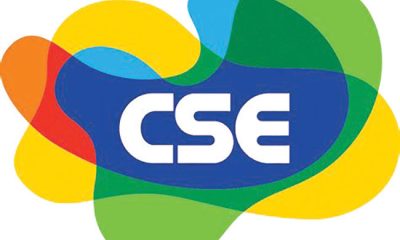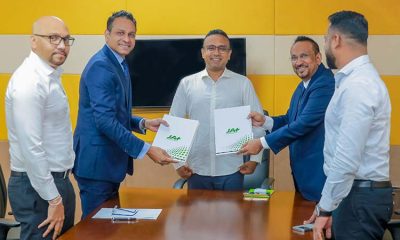Editorial
When beggars begin to choose …

Friday 29th October, 2021
China has taken exception to the detection by Sri Lankan scientists of harmful bacteria in the samples of a consignment of Chinese organic fertiliser to be imported. Tests were conducted twice and the samples were found to be contaminated on both occasions. Now, China wants the samples retested at another laboratory ‘acceptable to both sides’. The Sri Lankan government, whose leaders never miss an opportunity to wrap themselves in the flag, and vow to defend the country’s interests even at the expense of their dear lives, has meekly given in; we only see their submissive shrugs of resignation and feeble attempts to justify their servility. Will the process of fertiliser testing go on until the Chinese company concerned obtains the result it desires? Sri Lanka’s rejection of its product is bound to affect its trade with other countries adversely. That, however, is not this country’s problem.
There is no gainsaying that China has helped Sri Lanka in numerous ways and continues to do so, and Sri Lankans should be grateful to it. But China has no right to pressure this country to buy its fertiliser which has been found to be contaminated not just once but twice. There is the danger of foreign microorganisms that come with imported organic fertilser ruining the domestic agricultural sector. Once Sri Lanka’s National Plant Quarantine Service confirms the presence of harmful bacteria in fertiliser samples, the matter must be deemed closed. China should realise this as a true friend of Sri Lanka.
The ship carrying the contaminated fertiliser stock from China is reported to have gone missing since the Colombo Port announced its decision to deny it entry. It is being claimed in some quarters that the vessel has changed its name and is on its way to Colombo. Will it call at Hambantota instead? Anything is possible in this country, where corruption is the basis on which deals are cut. China, however, should not be singled out for criticism. Other countries and their companies also play tricks on Sri Lanka. It may be recalled that a British company involved in flyover business here has been fined in the UK for overseas corruption and breaching UN sanctions. The London court, which heard the case, was informed that Mabey and Johnson had started the practice of paying bribes to politicians to secure contracts in other countries in 1993. Some ruling party MPs are trying to figure out why on earth their government has entered into a clandestine agreement with a US energy firm; dozens of SLPP lawmakers have been pressing for an explanation, but their leaders have not responded.
Most of those who are condemning China for its attempt to have the contaminated fertiliser stock dumped here have never made an issue of the fact that Sri Lanka has become the dumping ground for substandard agrochemicals from other countries. Harmful hospital waste used to be brought here from the UK, and the much-maligned Customs officials, and the media had to fight quite a battle to put an end to the racket.
As for tests on imports, this is not the first time Sri Lankan scientific community’s professional integrity has been unfairly questioned. Following the detection of traces of agrochemical, dicyandiamide, in imported milk powder, the test reports were challenged in a similar manner. In 2013, Fonterra challenged the accuracy of tests conducted on its products here and claimed Sri Lanka did not have required technology to test for dicyandiamide in milk powder! The issue was thus obfuscated, and Sri Lankans, true to form, lost interest in it. Nobody knows whether Sri Lankans continue to consume agrochemicals with milk.
China, or any other country for that matter, should not be allowed to employ the same tactics as the Pettah pavement hawkers, who intimidate those who examine their wares carefully and express dissatisfaction. It must be left to Sri Lanka to have tests conducted on its imports and decide whether they are fit to be used here. But the problem is that the so-called Sri Lankan leaders beg for money from foreigners and benefit from the largesse of foreign governments and companies bent on putting crooked deals through here; they are concerned only about their personal interests.
Let the Sri Lankan scientists, who have been slighted, be urged to continue to test imported organic fertiliser and make their findings known to the public because the government is very likely to allow contaminated fertilser to be brought in, on some pretext or another, for obvious reasons.
Editorial
Brutal suppression of a nation’s conscience

Thursday 25th April, 2024
What Washington asked Sri Lanka not to do in the name of democracy, during Aragalaya in 2022, is being done in the US! There have been police crackdowns on US university students engaged in protests against Israel’s war in Gaza. Hundreds of undergrads have so far been arrested and their encampments in university premises broken up. Columbia University has cancelled in-person classes in view of student protests.
According to international media reports, the New York police descended on a student protest at a plaza near New York University after nightfall, the other day, arrested dozens of protesters, and pulled down their tents. They used force to neutralise the protesters who offered resistance. What the New York police did was similar to the crackdown we witnessed at Galle Face immediately after the elevation of Ranil Wickremesinghe to the presidency in 2022. Have the US police taken a leaf out of their Sri Lankan counterparts’ book, or is it the other way around?
American higher education institutions shaken by student protests against Israeli aggression in Gaza and police crackdowns in the US include Yale, Boston University, Massachusetts Institute of Technology, University of California, Berkeley, Princeton, and University of Michigan.
The unfolding drama in the US reminds us of the 2011 Occupy Wall Street (OWS) movement. The New York police crushed protest marches, using as they did pepper spray, etc., on protesters. Hundreds of OWS protesters who rose against growing inequality owing to corporate influence on the US government were arrested. However, they inspired people to hold similar protests in more than 900 cities in 82 countries across the world. Eleven years later, the US government took up the cudgels on behalf of those who were engaged in ‘occupy’ protests in Sri Lanka!
Why is the US, which pontificates to the rest of the world on the virtues of democratic rights, and even makes interventions to ensure that they are protected, crushing student protests ruthlessly instead of heeding the youth’s call for an end to the massacres in Gaza. After all, the Biden government itself has been compelled to declare that it is contemplating sanctions to rein in Israel, which continues its military operations in Gaza in spite of their enormous human, social and economic costs.
Washington censured President Wickremesinghe for chasing away protesters to clear Galle Face and enable the Presidential Secretariat to reopen in 2022. The Biden administration urged Colombo to tolerate democratic dissent and heed the voice of protesters. The question is why it is not practising what it preaches to others.
American university students have demonstrated that they have a sense of justice and a concern for human lives. They are right in holding protests to crank up pressure on their government to step in to stop massacres in Gaza. True, Hamas must be condemned for its acts of terror in October 2023, when it invaded some parts of Israel, killed many Israelis and took hundreds of civilians hostage. It must release all hostages without further delay. Israel’s right to self-defence cannot be questioned. But the Netanyahu government is using the Hamas atrocities as an excuse for its brutal campaign against Palestinian civilians. Its killing spree must be stopped forthwith, as the US students are rightly demanding.
Some Jewish students have reportedly complained of antisemitic harassment in recent days, and their complaints must be probed and action taken against the culprits, but crackdowns on protests against Israeli attacks on civilians in Gaza cannot be countenanced on any grounds.
The civilised world wept for Jews during Hitler’s reign of terror. Today, a hawkish Jewish government is making the world weep for Palestinians. The voice of moderate Jews who detest violence is suppressed.
The protesting US university students, we believe, represent America’s conscience, which is being systematically suppressed by the Washington-based hawks who thrive on bloody conflicts around the world. There is no way the Biden administration can cover its nudity.
Editorial
Needed: Action, not talkathons

Wednesday 24th April, 2024
There seems to be no end in sight to debates on the Easter Sunday carnage (2019), the latest being the one Parliament is scheduled to commence today. Chances are that the House will be thrown into turmoil, with the sittings descending into a three-day slanging match. If experience is anything to go by, nothing is likely to come of the debate.
It may be recalled that on 23 Oct., 2019, a Parliamentary Select Committee (PSC), which looked into the Easter Sunday terror attacks submitted its report to Parliament. The SJB MPs, who claim to have pressured the government to hold the debate to kick off today, were members of the Yahapalana government, which appointed the aforesaid PSC. One can only hope that parliamentary time will be utilised productively in the next few days.
As for the Easter Sunday attacks, there are several schools of thought, the prominent being that they were engineered by the SLPP to win the 2019 presidential election; ISIS had them carried out; Moulavi Mohamad Ibrahim Mohamad Nauffer, who is in custody, masterminded them, and they were part of an external conspiracy to destabilise Sri Lanka. The general consensus is that there was a conspiracy, as former Attorney General Dappula de Livera is reported to have said.
The claim that ISIS was responsible for the Easter Sunday terror attacks is widely considered far-fetched. Nobody seems to have taken it seriously.
A possible connection between the terror strikes and the SLPP was hinted at by the aforesaid PSC, which said in its report that a probe had to be conducted to find out whether they had been aimed at creating conditions for a regime change in the latter part of 2019.
The story that Nauffer is the terror mastermind is floated by the SLPP. In 2021, the then Minister of Public Security Sarath Weerasekera told Parliament that the FBI (of the US) had confirmed that Nauffer was the mastermind. But National Thowheed Jamaath (NTJ) leader Zahran Hashim’s wife, Fathima Haidya, told the Presidential Commission of Inquiry (PCOI), which probed the Easter Sunday carnage that Zahran and Nauffer had been in contact with a person called Abu Hind in India. Hind has been identified by an international expert of terrorism as a character created by a section of a provincial Indian intelligence apparatus. Zahran believed that Hind was an ISIS representative, according to the PCOI report. Pulasthi Mahendran aka Sara Jasmine, the widow of Muhammadu Hasthun, who blew himself at St. Sebastian’s Church, Katuwapitiya, in 2019, is believed to be privy to the NTJ’s secrets. Initially, it was claimed that she had died in a blast in a house in the East during a raid conducted by the army and the police, but it is now believed that she fled the country with the help of a foreign intelligence outfit. If she is still alive and can be arrested, it may be possible to ascertain information about the terror mastermind and the NTJ’s foreign links.
Politicians, religious leaders, high-ranking military and police officers, terrorism experts and Archbishop of Colombo His Eminence Cardinal Malcolm Ranjith himself have categorically stated in their testimonies before the PCOI that there was an external hand in the terrorist attacks.
Those who claim to have identified the Easter Sunday terror mastermind/s or ascertained vital information to prove who masterminded the carnage are heaving like the proverbial blind men who tried to figure out what an elephant was like by touching different parts of the animal’s anatomy, came to different conclusions and quarrelled. The Easter Sunday attacks, we believe, have not been investigated properly from all angles. Above all, former President Maithripala Sirisena’s claim that he knows who masterminded the carnage must be probed, and action should be taken against him if he has sought to mislead investigators.
Minister of Public Security Tiran Alles has renewed his offer to have the leaders of the Catholic Church briefed on the status of the ongoing police investigations into the Easter Sunday tragedy. Claiming that the Catholic prelates have not responded to his offer, he has said he is willing to take on board their views and even make adjustments to the probe, if necessary. Why his offer has not been accepted is the question.
There is no need for the Easter Sunday terror attacks to be debated in Parliament. What is needed is a thorough, credible investigation thereinto. The PCOI report has some flaws, as we have argued in a previous comment, but it is based on an extensive probe painstakingly conducted for a long time and contains valuable information. It can be the basis for a future probe besides the one being conducted by the police.
Editorial
Voters taken for a ride again

Tuesday 23rd April, 2024
Old habits are said to die hard. Although the leaders of the incumbent dispensation promised to heed the resentful youth’s strident call for a ‘system change’, in 2022, and mend their ways, they have, true to form, reneged on their pledge and shown signs of a relapse into the previous mode of behaviour, if the manner in which they are conducting their election campaigns is anything to go by.
Sri Lankan politicians, like their Indian counterparts, have earned notoriety for handouts-for-votes schemes. The SLPP-UNP government has embarked on a campaign to curry favour with poor voters by distributing free rice, state-owned lands/houses, etc. The people are being bribed with their own money, again! The distribution of free rice is likely to continue until the upcoming presidential election.
President Ranil Wickremesinghe is traversing the country as if there were no tomorrow, giving away rice, distributing title deeds for state land, and making various promises, obviously with an eye to the next presidential election. The UNP politicians who suffered ignominious electoral defeats in 2020 are trying to come in from the cold by taking part in the free rice distribution ceremonies, which must be costing the public more than the rice stocks being given away. Shouldn’t they use their personal funds, most of which were raised while they were in power, to grant relief to the public and gain political mileage?
The SJB is also giving away things. It says it is using its own funds for its vote-catching welfare programmes; however, it ought to reveal where funds for such projects come from. All political parties ought to maintain utmost transparency about their funds and transactions if they are not to be accused of benefiting from the largesse of unsavoury characters, who use their black money to bankroll political campaigns. None of them care to do so. Instead, they accuse each other of corrupt practices.
The JVP does not believe in giving; it only receives donations including designer clothes for its leaders, whose sartorial elegance seems to compare favourably with that of the young members of the Medamulana family. It has not even given back to the people what it grabbed from them during its reign of terror in the late 1980s. It should at least return their national identity cards!
The SLFP ought to curtail its expenditure and utilise the savings to enable its leader, Maithripala Sirisena, to pay compensation to the Easter Sunday victims in keeping with the Supreme Court order for his pathetic failure to prevent the terror attacks in 2019.
The practice of politicians doing political work at the expense of the public must end forthwith. There is absolutely no need for the President or the ministers or the members of the UNP to attend the rice distribution ceremonies. In fact, there must be no ceremonies at all. The distribution of free rice can be done through the Divisional Secretaries, Grama Niladhari and other state employees. That is what public officials are there for.
Equally, the public must not be made to pay for the Opposition Leader’s transport and security when he conducts political campaigns. The same goes for the ministers running around like headless chickens. A state minister’s official vehicle caught fire recently while he was zipping about in his electoral district to attend Avurudu sports events. He was not doing any official work, and therefore the cost of the fire-damaged vehicle must be recovered from him.
Whenever useless state functions are held in faraway places, to boost the ruling party politicians’ egos, the President, the Prime Minister, Ministers and military bigwigs fly there in separate helicopters, and the public has to foot the bill. They must be made to pay for such chopper rides from their personal funds.
Today is Bak Full Moon Poya Day. Politicians who live off the public, flaunt what they make out to be their piety, and sermonise, on days of religious significance. Let them be urged to make a resolution today to cease to be a burden on the hapless public, who are practising austerity and struggling to keep the wolf from the door.
-

 Business5 days ago
Business5 days agoCEAT Kelani launches three new radial tyre variants in ‘Orion Brawo’ range
-

 Business7 days ago
Business7 days agoDialog-Airtel Lanka merger comes centre stage
-

 Business4 days ago
Business4 days agoCeyline Travels and MBA Alumni Association of University of Colombo sign MOU
-

 Business7 days ago
Business7 days agoSLFEA appoints JAT as a Facilitation Partner for training painters to provide overseas employment opportunities
-

 Business5 days ago
Business5 days agoHayleys Fabric celebrates triple triumph at ISPO Textrends Spring/Summer 2026
-

 Business6 days ago
Business6 days agoUrgent appeal from Sri Lankan exporters on rupee appreciation
-

 Business4 days ago
Business4 days agoMaldivian to launch direct flights to Colombo
-

 Sports4 days ago
Sports4 days agoHello Madras, ‘ai api kaluda?’



























